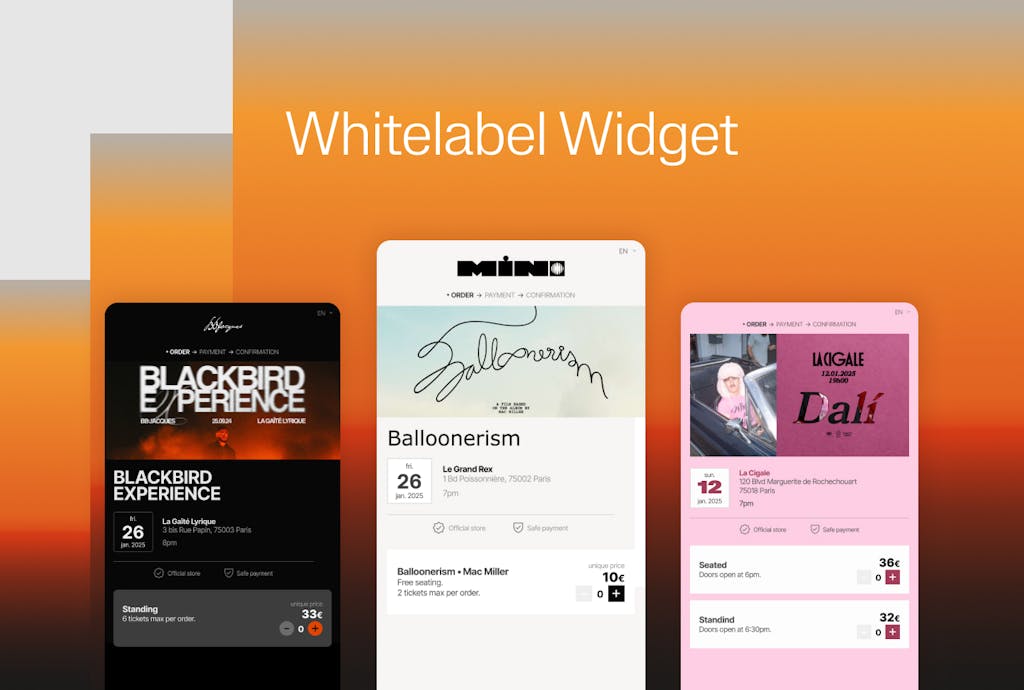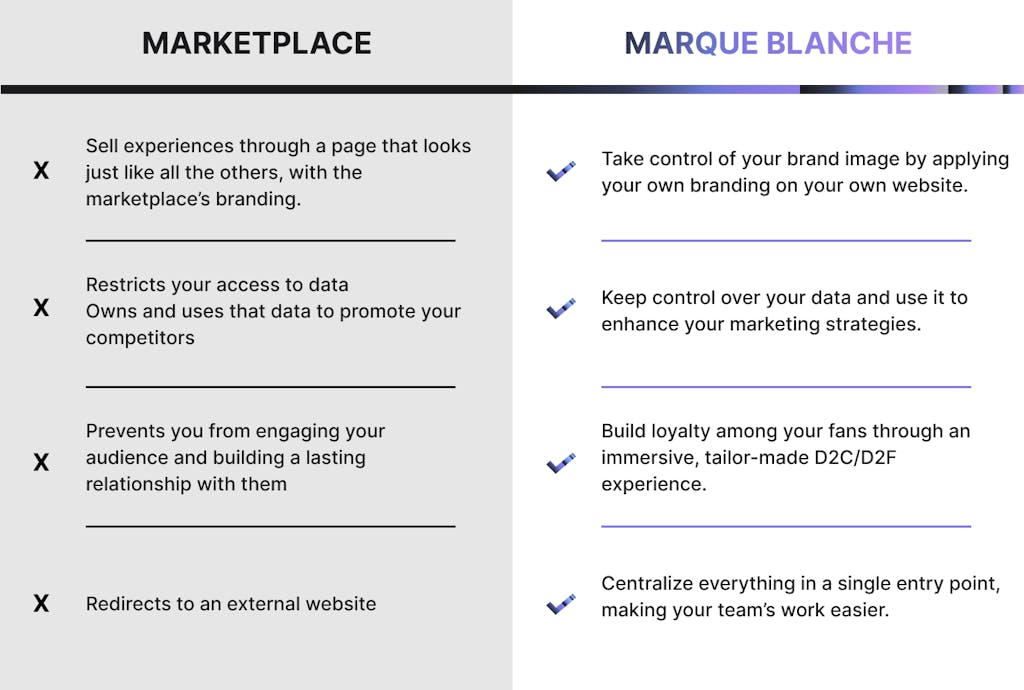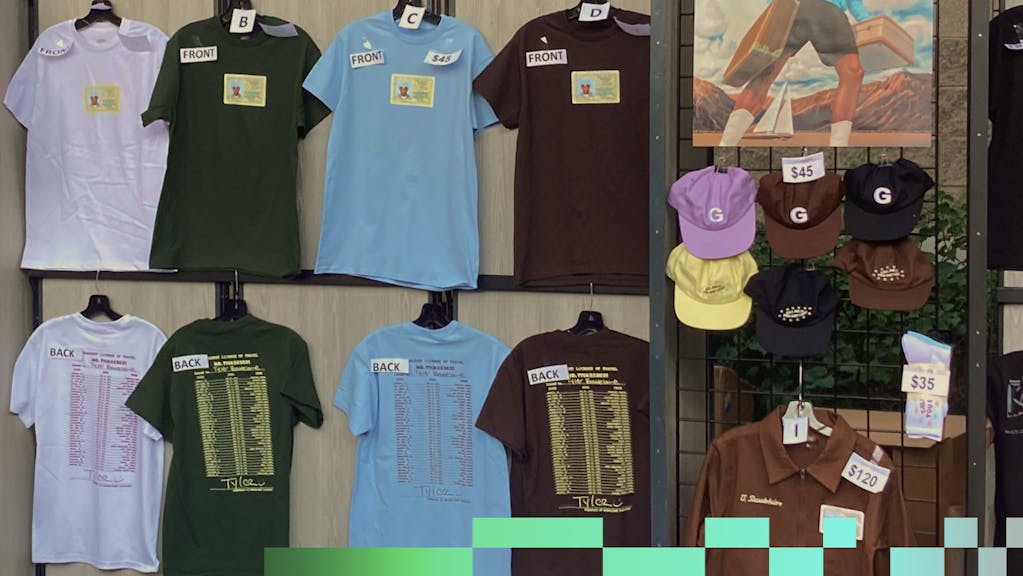
Whitelabel benefits for your brand
6 min read
•May 20, 2025
Today, most event creators rely on third-party platforms to manage their ticketing and interact with their audience. While these solutions offer a degree of visibility, they also appropriate a large part of the relationship with fans, limiting access to data and reducing direct monetization opportunities.
Faced with these limitations, D2C (Direct-to-Consumer) and D2F (Direct-to-Fan) models are emerging as a strategic alternative. Thanks to white-label platforms, event creators can sell tickets, products and experiences on their own site without depending on a third party. This approach not only strengthens their brand image, but also enables them to capture and exploit valuable audience data to optimize engagement and ensure sustainability.
The first to benefit from this direct relationship? Superfans. To understand who they are and why they're important, click below.
1. What is a white-label platform?
a. Definition and industry context
The term "white label" refers to a business model in which a company offers products or services developed by a third-party supplier, without the latter incorporating its branding. The aim? To have a turnkey solution fully adapted to your brand identity.
More nuanced and to be differentiated, we also find the "gray label". Here, the product or service, although distributed by another company, clearly indicates its origin. The user knows that the service comes from a third-party supplier.
White-label solutions have rapidly become strategic levers for many players, particularly in e-commerce.
In the events sector, the integration of a white-label platform enables event organizers to sell tickets directly from their website, enhancing the user experience and consolidating the relationship with their audience.

b. Use cases
Whether in e-commerce, ticketing or fintech, this model has become certain companies favorite playground :
- Shopify, THE reference:
In e-commerce, solutions have profoundly transformed the way companies sell online. Shopify is one of them. Their solution enables companies to fully customize their store (logo, color, design...) while benefiting from payment, inventory and marketing management features.
This benchmark in white labeling has won over the biggest brands in all sectors: Jimmy Fairly, Kylie Cosmetics, Tesla, Heinz... as well as artists (Angèle , for example) and sports teams (Vitality). A fine illustration of the unlimited potential of the white-label model.
- Linktree & Beacons, creating links
Platforms such as Linktree and Beacons enable creators to centralize all links to their various platforms (social networks, online store, ticketing, exclusive content...) in a single location. Rather than having to choose a single link to display in their bio, they offer them a single URL that redirects their audience to all the resources they wish to showcase. Color, font, buttons, logo... The interface is entirely customizable to reflect your identity.
- Stripe, discreetly
Its strength? To offer an entirely white-label payment solution, seamlessly and invisibly integrated into e-commerce sites, applications or SaaS platforms. As a result, end-users never see Stripe, but remain immersed in the world of the brand they're buying from. This model enables companies to personalize the user experience right through to payment, while taking advantage of Stripe's technology and security.
- CMS, web architects
CMS such as WordPress, Webflow or Wix make it easy to create websites without a master's degree in coding. These platforms offer a wide range of customizable templates, enabling you to design a site perfectly suited to your needs and image. With the ability to add widgets and white label integrations, you can maintain complete control over the look and feel of your brand.
- Billy 😎 (Business is business huh)
Well, we're talking about widgets... on our blog... it would be a shame not to take advantage of them. Integrating a ticketing widget directly on your site (as Billy does) allows organizers to sell their tickets without intermediaries and without distorting their brand image. Festivals, artist tours, sports or e-sport competitions... whatever the event, a white-label solution guarantees a fluid and coherent experience, aligned with your universe.

2. The main benefits of a white-label ticketing solution
a. Control your image and boost its value
When attendees, and especially your fans, buy tickets, they need to feel they're doing so with your brand, your event, and not via a third-party platform.
By personalizing the interface to your image (branding, visuals, UX), you stay true to the universe you've created, and allow it to expand even further. A strong brand inspires confidence, reinforces the perceived value of your offers and improves your positioning in relation to the competition. The more consistent and controlled your identity, the more pleasant and engaging the user experience, which is a crucial asset for building audience loyalty and increasing sales.
b. An immersive fan experience
Why limit the purchase of a ticket to a simple transactional act? This act is the first step in the experience of your event, and very often this moment translates into stress and frustration. An interminable queue, the fear of not having a seat, the cat walking on the keyboard, until the moment of release when the ticket is finally yours (or not 😢 ).
It's therefore essential to make the user journey as pleasant and fluid as possible to win your audience's heart from the very first interaction.
Thanks to personalized landing pages and a made-to-measure shopping experience, fans remain immersed in your world, with an interface designed for them and by their favorite brand/creator Beyond design, this personalization allows you to tailor offers to fans' expectations, boosting their engagement and satisfaction.
By cutting out the middleman, you create a direct link between you and your audience. This D2C (Direct-to-Consumer) / D2F (Direct-to-Fan) model enables you to control the entire buying experience and personalize every interaction. THE secret to building an authentic, lasting relationship with your fans.
c. Control your data and boost fan engagement
By using an external ticketing solution, you lose out on a major strategic resource: customer data. Many platforms limit your access to data and exploit it for their own profit. They use your buyers' data to recommend and promote similar events - sometimes those of your competitors. By redirecting your fans to other offers, they dilute your impact and limit your ability to build audience loyalty.
With a white-label ticketing service, you control your data and centralize them in one place. No more right-to-left tools: a single point of entry simplifies link distribution, standardizes communication and facilitates performance monitoring. By always redirecting to the same site, analysis of the purchase path and traffic sources becomes much more fluid. You know who buys your tickets, where your participants come from and what their behavior is. A thorn in the side of your marketing team, don't you think?
These insights enable you to segment your audience, refine your marketing campaigns, set up effective re-targeting and propose personalized offers that boost your community's engagement.
Having this data in-house is also essential for building a solid long-term strategy, anticipating trends and ensuring the longevity of your brand.

Conclusion
In a sector where experience and loyalty are fundamental, white-label ticketing is an essential solution. It offers total personalization, guaranteeing a fluid and immersive purchasing experience, perfectly in tune with your brand universe. No more dependence on marketplaces: you retain control over your branding, your offers and, above all, your customer data, a strategic asset for fine-tuning your campaigns and maximizing the engagement of your community.
This independence gives you a decisive competitive edge. By building a direct link with your fans, you optimize your revenues, while reinforcing the perceived value of your brand. More than just a ticketing service, you create a genuine D2C & D2F ecosystem, ideal for ensuring the longevity of your project.
How about taking back control?

